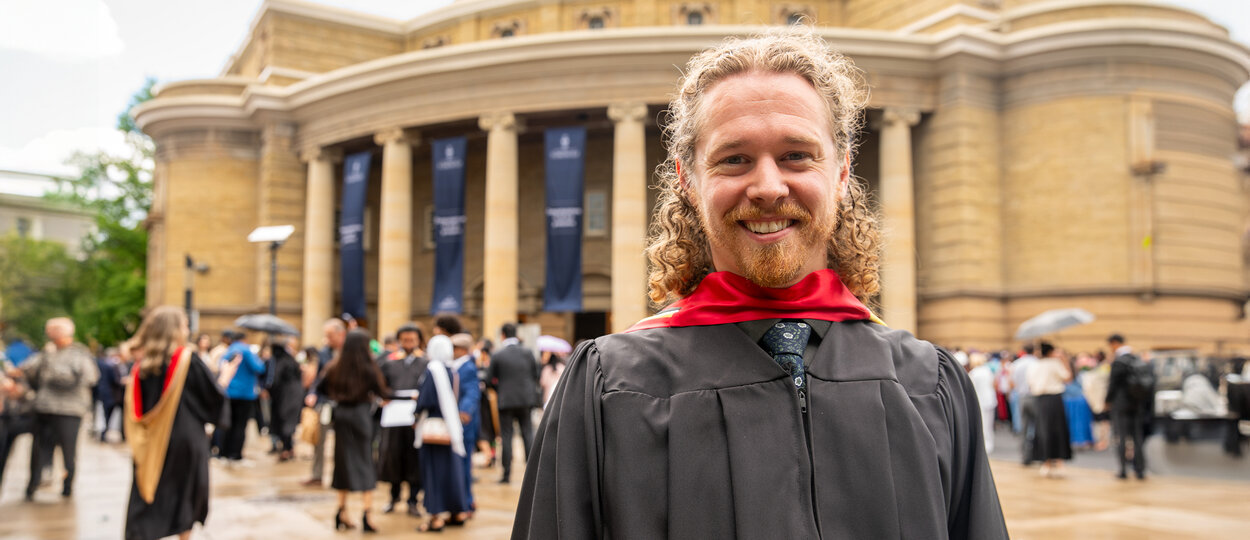Brandon Toner says PharmD has helped prepare him to deliver clinical services and improve patient care
As the pharmacy profession undergoes significant changes, Brandon Toner, 2T4 graduate with honours from the Doctor of Pharmacy (PharmD) for Pharmacists program at U of T’s Leslie Dan Faculty of Pharmacy, says the program has helped him embrace the changes with optimism.
“It’s an exciting time to be in pharmacy, and where it’s possible to be either excited or intimidated, it’s worthwhile arming yourself with the tools to be excited,” says Toner, a community pharmacist in Sydney, Nova Scotia.
Having graduated with an entry-to-practice Bachelor of Science in Pharmacy from Dalhousie University in 2015, Toner says he initially thought PharmD programs were best suited for pharmacists who practice in hospitals or conduct research.
But as he saw how the scope of pharmacy practice in Nova Scotia – like in many jurisdictions – was starting to change, with pharmacists taking on greater responsibilities and providing more services to patients, he saw how a PharmD could help him improve patient care in his community practice.
One major change in the profession in Nova Scotia is the introduction of government-funded pharmacist-led primary care clinics. In these clinics, pharmacists provide prescription refills, immunizations, prescribe for minor ailments, and conduct medication reviews. They also help manage and treat chronic diseases including asthma, chronic obstructive pulmonary disease (COPD), diabetes and high blood pressure.
“Some folks are really excited about the changes coming to clinical services, but there is also a lot of apprehension, and I wanted to make sure that I could maintain a positive outlook on the profession, which to me meant continuing my education to be the best pharmacist I could be so I could embrace and lead that change,” he says. “I could see the shift in the profession and wanted to be a meaningful contributor to it.”
After considering various options to pursue his PharmD, he decided on the Leslie Dan Faculty of Pharmacy based on its excellent reputation and experience in delivering high-quality online education, which allowed him to continue working full-time while pursuing his degree.
Rotations focused on implementing enhanced clinical services
Toner enjoyed returning to the university environment, especially combining the deeper understanding of foundational pharmacy topics with his practical experience in the community. He also became involved with student leadership, serving as class representative for two years, ensuring that the students were having a positive experience and meeting with potential students to talk about the program.
Toner says that a highlight of the program was the practical rotations, which allowed different experiences from his own day-to-day practice, while sharing the common theme of transitioning to expanded clinical services. Toner gained experience working with pharmacy teams to make this transition through a rotation at Prescription to Thrive, a program run by the Pharmacy Association of Nova Scotia that helps community pharmacists implement more clinical services. He was then able to use this experience in his rotation at a community pharmacy in Newfoundland, with PharmD for Pharmacists alum Stephanie Burden. He also completed a research rotation with Zubin Austin, professor at the Leslie Dan Faculty of Pharmacy, examining pharmacists’ relationships to change, as well as a rotation providing care at one of Nova Scotia’s pharmacist-led primary care clinics.
“Having the privilege to experience diverse practice roles and settings through my rotations has expanded my vision for the profession and helped me to develop a degree of expertise and confidence, especially in the clinical service and primary care roles, that I think will serve me well in the future.”
“Having the privilege to experience diverse practice roles and settings through my rotations has expanded my vision for the profession and helped me to develop a degree of expertise and confidence, especially in the clinical service and primary care roles, that I think will serve me well in the future,” he says.
“The rotations were the most meaningful experience with the program, but it was all built on the foundation that provided a deeper understanding of practice and pharmacotherapy.”
With the program now complete, Toner plans to remain in community pharmacy and is keen to use the skills and experience from the PharmD for Pharmacists program to implement clinical services into his practice so that patients experience a higher quality of pharmacy care. He is also excited to continue to use leadership and facilitation skills to assist other pharmacy teams in implementing more clinical services. He says that balancing a full-time practice with a demanding program was challenging at times, but continuing education is critical in a profession that is changing so much.
“With how much the profession has changed and is changing, it’s so helpful to continue to invest time and energy into your professional development, and sometimes it takes committing to continuing education in a deeper way to really take your practice to the next level,” says Toner. “Of course, there’s sacrifice and effort and commitment associated with all of that, but in my experience, it’s been worth it.”
More News
Image

Dean Lisa Dolovich reappointed for second term
Professor Lisa Dolovich has been reappointed for a second term as Dean of the Leslie Dan Faculty of Pharmacy, University of Toronto, effective July 1, 2025, to December 30, 2030.
Read More
Image

Pharmacy Summer Camp gives high school students insight into pharmacy profession
A new summer camp based at the faculty will give high school students a range of experiences in pharmacy and pharmaceutical sciences.
Read More
Image

Team GloveLift wins 2025 Business Plan Competition with innovative medical device
PharmD students win $5,000 prize for their innovative medical device concept aimed at improving patient care.
Read More
